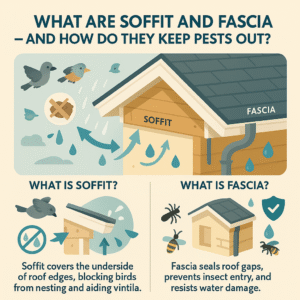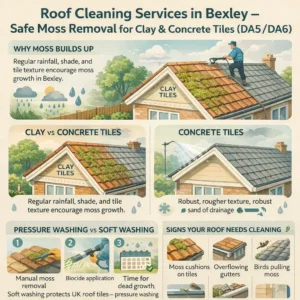What’s the Difference Between Soffit and Fascia?
The roof is more than just the top of your home—it’s the first line of defense against nature and a key part of your home’s curb appeal. At Guttersgurus, we know how important every part of your roofing system is, especially two key components: soffit and fascia.
These elements not only add beauty but also protect your home from water, pests, and structural damage. Understanding the difference between soffit and fascia can help you make better choices for your home’s maintenance and improvement.
What Are Soffit and Fascia?
Both soffit and fascia are essential to your roofing system, playing a role in both protection and aesthetics. Here’s a closer look:
What Is a Soffit?
The soffit is the underside part of the roof that sits between the outer wall of your home and the roof’s edge. It’s often made from materials like vinyl, aluminum, or wood.
Its main job? Ventilation. The soffit allows fresh air to flow into the attic and helps prevent moisture buildup, which can cause mold or rot. It also stops pests like insects and rodents from entering your roof space.
But that’s not all. Soffits give a clean, finished look to the roofline, improving the exterior appearance of your home.
What Is Fascia?
The fascia is the vertical finishing edge that runs along the lower edge of the roof, directly above the soffit. This board is usually where the gutters are attached.
Fascia acts as a barrier between the edge of the roof and the outdoors. It protects your roof from water damage caused by rain and snow, and it also adds a polished look to your home’s exterior.
At Guttersgurus, we often install fascia boards that not only look great but also handle tough weather for years.
Why Soffit and Fascia Matter
While soffit and fascia serve different purposes, they work together to protect and enhance your home.
Soffit
Improves attic ventilation
Reduces risk of mold and moisture damage
Keeps insects and small animals out
Enhances your home’s look
Fascia
Supports the gutters
Shields the roof edge from rain and snow
Adds structure and visual appeal
Prevents water from seeping into the roof
Key Differences Between Soffit and Fascia
| Feature | Soffit | Fascia |
|---|---|---|
| Location | Underneath the roof edge | Along the roof edge |
| Function | Ventilation and pest control | Water protection and gutter support |
| Appearance | Horizontal/flat | Vertical/visible from the street |
| Materials | Vinyl, aluminum, wood | Often thicker and more water-resistant |
Both are important—but for different reasons. Installing quality soffit and fascia helps protect your investment and reduces the need for costly future repairs.
Benefits of Installing Soffit and Fascia
Upgrading or replacing your soffit and fascia can offer long-term benefits:
Protects structural integrity by managing moisture
Improves ventilation and indoor air quality
Enhances curb appeal with a cleaner roofline
Supports gutters, preventing water overflow
Increases property value
At Guttersgurus, we provide professional soffit and fascia installation that ensures your home is both protected and visually appealing.
Conclusion: Soffit and Fascia Are Small Parts That Make a Big Difference
Choosing the right soffit and fascia—and making sure they’re properly installed—can extend your roof’s lifespan and improve your home’s overall performance. Whether you’re upgrading an older system or building new, Guttersgurus is here to help you make smart, lasting choices.
Frequently Asked Questions
Can soffit and fascia be repaired?
Yes. Depending on the level of damage, both can be repaired or replaced. A professional can assess the issue and recommend the best option.
When should I replace soffit or fascia?
Look for signs like cracks, water stains, peeling paint, or mold. Early replacement can prevent more serious damage to your roof and walls.
Are soffit and fascia really necessary?
Absolutely. They protect your home from moisture, pests, and weather damage. Plus, they give your roof a finished, well-maintained look.




